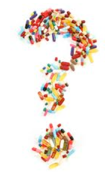Suffering from certain medical conditions may even make some drugs harmful to you. An example of this type of interaction could be for someone with very high blood pressure to use a nasal decongestant.
Lowering your risks
 Relationship with your doctor: It’s in your best interest to develop a good relationship with your primary care physician. You should inform your doctor about all natural products, over-the-counter medications and herbal supplements you take. Past surveys have found that patients may not think about mentioning supplements to their physicians. Always alert your primary care physician if other health care professionals prescribe a new drug for you.
Relationship with your doctor: It’s in your best interest to develop a good relationship with your primary care physician. You should inform your doctor about all natural products, over-the-counter medications and herbal supplements you take. Past surveys have found that patients may not think about mentioning supplements to their physicians. Always alert your primary care physician if other health care professionals prescribe a new drug for you.
Make a list: Keep a regularly updated list of all prescriptions, OTC drugs, and supplements, including dosages.
Review: Ask your doctor to review your drugs to make sure they are all still needed and if they are safe to combine. This can be done once or twice a year.
Don’t be afraid to ask questions: Ask your doctor and pharmacist about potential side-effects and possible interactions of medications you are taking. Ask whether you should avoid certain foods, beverages or other products. Don’t just start taking a new OTC or supplement without finding out more about it and possible interactions first. Ask about how the drug will work in your body.









